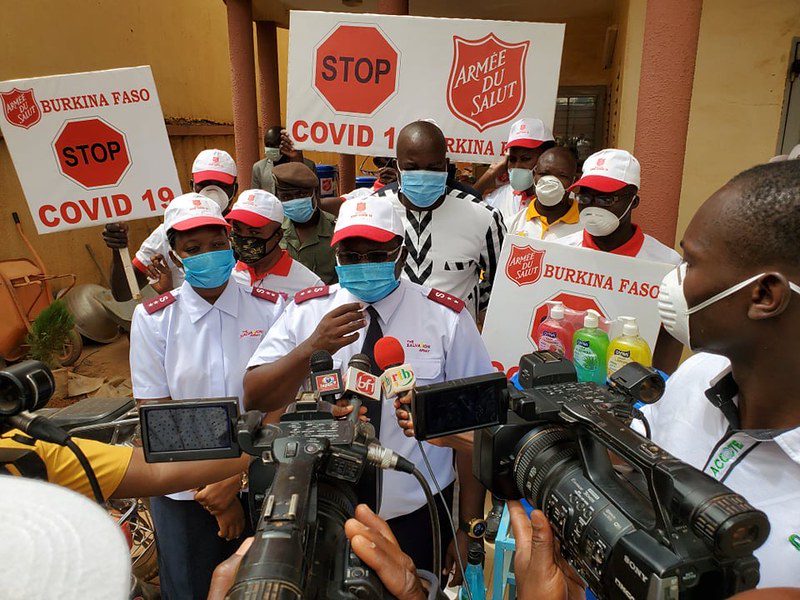The Salvation Army in this West African country is becoming better-known thanks to its response to the COVID-19 pandemic.
In Burkina Faso, a landlocked West African country, international funding combined with local knowledge and a concerted effort to understand the most pressing needs have resulted in a project that will help people as they try to stay safe during the COVID-19 pandemic. The sharing of vital cleaning supplies is raising the profile of The Salvation Army in a country where it has been present for only a few years.
Burkina Faso was one of the first countries in West Africa to be affected by COVID-19 and the government reacted quickly. The country is already six weeks into lockdown.
“We all knew this wasn’t going to be easy but the measures have generally been accepted and people are trusting the government to save their lives,” said Captains André and Nana Fatouma Togo.
People are suffering because of a lack of money and food supplies. Many people typically survive through small business activities that have been either shut down or greatly restricted.
“At first, we were feeling a bit afraid for what this would mean for our ministry,” the Togos said. “As pastors, we are always with people, in their homes. We were worried what would happen when we could no longer do this and asked God how we could move on. Gradually we started to realize that we can be useful even though confined.
“We started to make phone calls and publish Facebook video Bible messages to offer support and encouragement… It is very hard in our African context when you try to keep distance from people. We are their pastors—how can we make sure that people don’t think that we are avoiding them? This is a struggle. This is particularly a challenge for the ladies who are so used to always being with each other. So, we continue to try to uplift each other through phone messages and some surprise [distanced] visitations for specifically-targeted people who are really vulnerable, such as the elderly who live alone.”
Their ongoing contact with members of the community made it clear that people were finding it very difficult to obtain hand sanitizer and cleaning equipment, so—working through the Mali Region, which oversees the ministry in Burkina Faso—they applied for Rapid Response funding from The Salvation Army International Headquarters.
With this money and some additional local contributions, the Togos managed to obtain hand sanitizer gel (which they said was “quite hard to source since it is in great demand and limited supply”) and hand-washing equipment (bucket, bowls and soap) to be placed at the entrance to people’s homes. They also bought food items to support some of the most vulnerable individuals and families.
“Our response began in the communities in which we work,” they said. “Through previous projects and home visits we already know well those who are the most in need in these communities, so we had lists in place. Last Friday we managed to get special permission to transport some of these supplies to the community around Bobo-Dioulasso Corps [at least 300 kilometres from the capital, Ougadougou].
“We then contacted the local community mayor to offer Salvation Army support for others. We met with the mayor who advised us of 10 local markets which had been closed down and expressed his concern for the well-being of the women who sell in those markets since their living is really ‘hand-to-mouth.’ So this morning [April 21] we will go to hand over supplies of hand sanitizer gel and hand-washing equipment to the mayor’s office, to be distributed to these vulnerable women and their families.”
When the hand-over happened, it was covered by national TV and other private media including Impact TV, BF1 TV and Savane radio. For a country that has only had official Salvation Army ministry since 2018, this was a remarkable opportunity to raise awareness and let people know that The Salvation Army is in Burkina Faso to serve everyone.
The Togos recognize that the pandemic provides an opportunity for God to “really [do] something in the midst of this calamity.”
“We didn’t know of these people before the COVID-19 lockdown,” they said. “We were just limited in reach to our own community… The government, being so thankful for our support, asked us repeatedly if they could call the national media to cover the event… This is a first for The Salvation Army here in Burkina Faso. We will have more airtime than ever before.
“Until now, people haven’t known The Salvation Army very well but, through this support to the most vulnerable in our communities, God is opening up an occasion for them to see what The Salvation Army is and what we can do. God is really working through this situation, bringing good out of bad!”
Report by IHQ Communications
Interview with Captains Togo by Jo Clark
A video, in French, produced by Impact TV is available on IHQ’s YouTube and Vimeo channels.
The latest on The Salvation Army’s international COVID-19 response, including an interactive Google Map, is available at sar.my/covid19.
HOW TO HELP:
- If you’d like to make a monetary donation, please click here to make a gift.
- Text ‘GIVE’ to 52000 to make a $10 donation to The Salvation Army. This will automatically add a one-time donation to your next mobile phone bill.
- For information about volunteering, please visit volunteer.usawest.org.
- To learn more about how to support The Salvation Army’s relief efforts, please click here.












